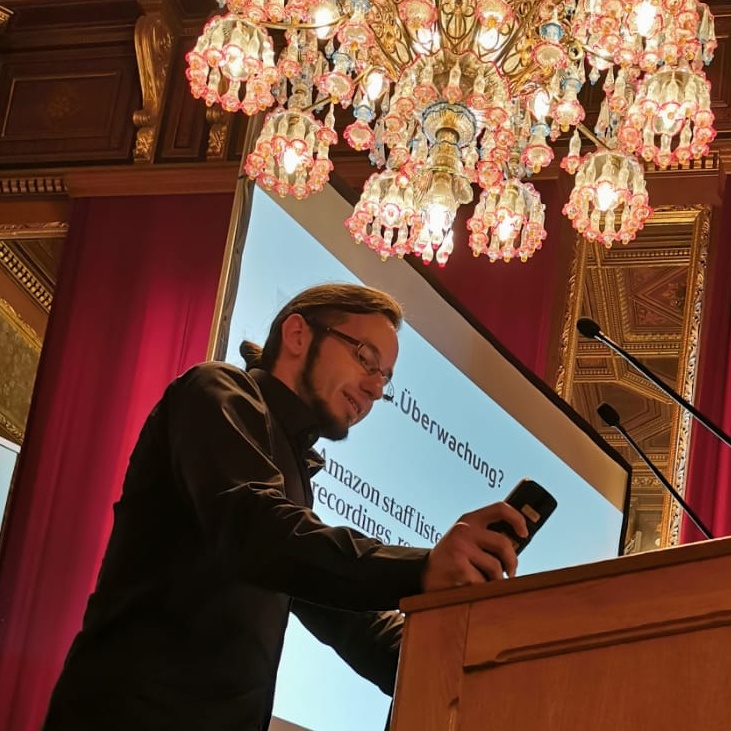
Harald is a games researcher, media pedagogue and cultural mediator based in Graz, Austria. He works for the Styrian Government as an expert in digital culture. At Ludovico – an NGO focusing on the culture and pedagogics of play – he is responsible for all activities concerning digital play and organizes the annual button Festival of Gaming Culture. He wrote his doctoral thesis on »Digital Play and the Longing for Agency« and holds a PHD in Cultural Anthropology from the University of Graz.
Owning the Stats – Gaming and Neoliberal Subjectivity
FROG 2020 – Short Talk
Digital play, as I plan to argue, uncovers cracks in the theoretical surface of common descriptions of modern societies. Games undermine binary concepts of reality and fiction, presence and absence, heterotopia and utopia. I propose that through these cracks digital games offer opportunities to evade aspects of materiality, especially considering the body and the governmental forces that influence it. And a thorough look at player’s motivation to engage with the medium shows how these opportunities affect games and their communities. Based on an understanding of digital games as experiences that do not end with the game-worlds and the margins of the game’s code, I want to demonstrate how digital games can be used as mirrors, offering a new perspective on neoliberal societies and people’s struggles to deal with the requirements they feel to be expected to fulfill in order to be valuable parts of said societies. In social contexts with strong tendencies to understand individuals as a set of metrics, many digital games offer possibilities to take control of the numbers and to experience a form of agency often lacking in everyday life. Gaming spaces invite us to play with power structures. But whether they stabilize or undermine them remains to be evaluated.







 Who am I?
Who am I? Thomas Kunze is the founder and CEO of Games Institute Austria and the registered association Spielmacher. Trained as a teacher and linguist he worked as a teacher and headmaster for 15 years. Since 2015 he cooperated with several universities, i.e. the University of Teacher Education Vienna or the Danube University Krems. With his company he specialised in Gamification, Game Based Learning and Training. At the moment, they focus in Escape Rooms, Esports, Virtual Reality and Livestreaming. The Games Institute Austria works internationally with other companies from the same branch and cooperates with schools, universities and other institutions. You can find out more at
Thomas Kunze is the founder and CEO of Games Institute Austria and the registered association Spielmacher. Trained as a teacher and linguist he worked as a teacher and headmaster for 15 years. Since 2015 he cooperated with several universities, i.e. the University of Teacher Education Vienna or the Danube University Krems. With his company he specialised in Gamification, Game Based Learning and Training. At the moment, they focus in Escape Rooms, Esports, Virtual Reality and Livestreaming. The Games Institute Austria works internationally with other companies from the same branch and cooperates with schools, universities and other institutions. You can find out more at  s “herr-max” Nemeth is an independent education and career consultant. His focus is on the one hand in the regular training and further education of trainers, teachers and coaches in the field of digitization, DGBL, ICT and social medias on behalf of renowned educational institutions. On the other hand, he works throughout in the scope of apprenticeship, basic education, educational counselling and as a youth coach in a work foundation. His methodology and his main interest here is the gamification of learning tools and the use of digital games in the classroom. Max is a board member of the VÖBB association and Spielmacher association, researching and holding lectures and workshops for “gaming guidance competence”.
s “herr-max” Nemeth is an independent education and career consultant. His focus is on the one hand in the regular training and further education of trainers, teachers and coaches in the field of digitization, DGBL, ICT and social medias on behalf of renowned educational institutions. On the other hand, he works throughout in the scope of apprenticeship, basic education, educational counselling and as a youth coach in a work foundation. His methodology and his main interest here is the gamification of learning tools and the use of digital games in the classroom. Max is a board member of the VÖBB association and Spielmacher association, researching and holding lectures and workshops for “gaming guidance competence”.